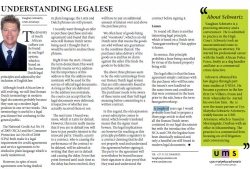KZN Business Sense - Understanding legalese:Vaughan Schwartz, UMS Attorneys2016-02-19 The diversity of South African culture can be found in our legal system, which is based on the Roman Dutch legal principles and adjusted by the inclusion of English law.
Although South African law is still evolving, we still find Roman Dutch terminology in modern legal documents probably because they sum up a modern legal position in one or two words. This terminology is useful to a legal practitioner but confusing to the general public. The National Credit Act No 34 of 2005 (NCA) and the Consumer Protection Act No 68 of 2008 (CPA) both make it a legal requirement for credit agreements and service agreements to be drafted in plain language which is easily understood. However, in spite of most agreements now being drafted in plain language, the Latin and Dutch phrases are still present. I recently went through an offer to purchase (purchase and sale agreement) and found that there were still Roman Dutch terms being used. I thought that it would be useful to analyse these phrases. Right from the start, I found the term domicilium.This word literally means service address but the importance of this address is that the address you nominate will be used for the service of official legal documents. As long as they are delivered to the address you nominate, the courts can accept that the legal documents were delivered;irrespective of whether you actually received them or not. The next term I found was mora, which is Latin for default. However, this term really means that if you are in default you will have to pay penalty interest to the innocent party. Usually, a party to a contract, who is causing the performance of the contract to be delayed, will be advised in writing that they are in default and causing the delay. From that point forward until such time as the delay has been resolved, they will have to pay an additional amount of interest over and above the purchase price. We often hear of goods being sold “voetstootsâ€, which is an old Dutch term that means the goods are sold without any guarantees to the condition thereof. The purchaser takes delivery of the goods as is and has no claim against the seller if he finds the goods to be defective. The above three phrases seem to be the only terminology from our Roman Dutch legal system that are still commonly found in purchase and sale agreements. The purchaser needs to be aware of these terms and their full legal meaning before committing to a written contract. In this regard, the old expression caveat subscriptor comes to mind, which loosely translated means that the signer must beware. The legal implications are however far reaching as this principle prohibits a signatory to a contract claiming that he did not properly read and understand the agreement before signing it. The party to the agreement will nevertheless be bound because their signature is clear proof that they read and understood the contract before signing it. Leases To round off, there is another interesting legal principle, which is based on a Dutch term “huurgaatvoorkoop†that applies to leases. In essence, this principle prohibits a lease being cancelled by virtue of the leased property being sold. The legal effect is that the lease agreement simply continues with the purchaser who will become the tenant’s new landlord on the same terms and conditions that were contained in the lease prior to the sale, hence the term huurgaatvoorkoop. A couple of years ago I would probably have had to prepare a three page article to deal with all the Roman Dutch terms contained in our legal documents but with the introduction of the NCA and CPA the legalese have been drastically reduced and only a handful are still found in modern legal documents. Tel: +27 31 312 2064/9055 vaughan@umslaw.com www.umslaw.com |
KZN Business Sense - Understanding legalese:Vaughan Schwartz, UMS Attorneys
Copyright © 2024 KwaZulu-Natal Top Business
